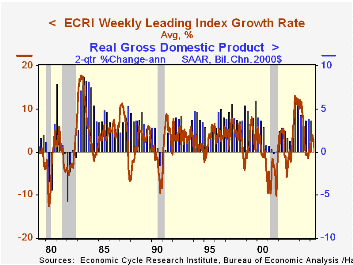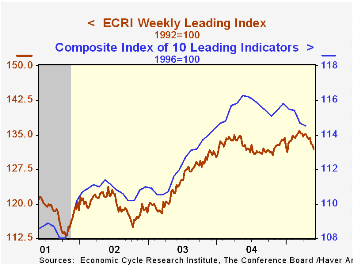 Global| Jun 06 2005
Global| Jun 06 2005ECRI Leading Economic Index Trending Lower
by:Tom Moeller
|in:Economy in Brief
Summary
The weekly leading index of the US economy published by the Economic Cycle Research Institute (ECRI) fell last week for the fifth week in the last six. The 0.6% decline lowered the index 2.9% versus the peak in early March. During the [...]

The weekly leading index of the US economy published by the Economic Cycle Research Institute (ECRI) fell last week for the fifth week in the last six. The 0.6% decline lowered the index 2.9% versus the peak in early March.
During the last ten years there has been a 54% correlation between the change in the weekly leading index and the change in US real GDP growth during the following quarter. The correlation has risen to 67% during the last five years. During the last ten years there has been a a 70% correlation between the y/y change in the ECRI leaders and the change in the Conference Board's Index of Leading Economic Indicators.
Six month in the leaders fell to near zero. While down sharply from the double digit growth rates logged during 2003, recession is not indicated. Negative growth in excess of -4% typically preceded past U.S. recessions.
A slowdown in economic growth may or may not be indicated by the more than 10 percentage point slowdown in the leaders' growth. During both the late 1980s and the late 1990s, the leaders slowed by an even greater degree and little slowing in real GDP occurred. 
Weakness in the leaders has been broad based. The components of the Conference Board leaders weigh heavily on the financial and the factory sectors (which are the more volatile of the US data series) and both sets are indicating slower growth.
Visit the Economic Cycle Research Institute for analysis of US and international business cycles.
| Economic Cycle Research Institute | 05/27/05 | 12/31/04 | Y/Y | 2004 | 2003 | 2002 |
|---|---|---|---|---|---|---|
| Weekly Leading Index | 132.0 | 132.4 | -0.6% | 132.5 | 124.8 | 119.9 |
| 6 Month Growth Rate | 0.7% | 1.4% | 4.3% | 6.5% | 1.1% |
Tom Moeller
AuthorMore in Author Profile »Prior to joining Haver Analytics in 2000, Mr. Moeller worked as the Economist at Chancellor Capital Management from 1985 to 1999. There, he developed comprehensive economic forecasts and interpreted economic data for equity and fixed income portfolio managers. Also at Chancellor, Mr. Moeller worked as an equity analyst and was responsible for researching and rating companies in the economically sensitive automobile and housing industries for investment in Chancellor’s equity portfolio. Prior to joining Chancellor, Mr. Moeller was an Economist at Citibank from 1979 to 1984. He also analyzed pricing behavior in the metals industry for the Council on Wage and Price Stability in Washington, D.C. In 1999, Mr. Moeller received the award for most accurate forecast from the Forecasters' Club of New York. From 1990 to 1992 he was President of the New York Association for Business Economists. Mr. Moeller earned an M.B.A. in Finance from Fordham University, where he graduated in 1987. He holds a Bachelor of Arts in Economics from George Washington University.
More Economy in Brief
 Global| Feb 05 2026
Global| Feb 05 2026Charts of the Week: Balanced Policy, Resilient Data and AI Narratives
by:Andrew Cates






